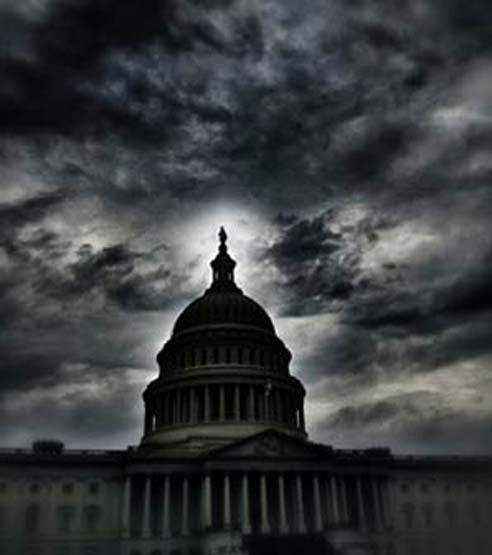
The combination of the lack of medical expertise and a political environment that is quite poisonous, metaphorically speaking, has left Congress in a state of suspended animation. Lawmakers cannot decide whether to stay in session to rally a response to the growing crisis or whether to flee town, possibly adopting the "social distancing" technique that some experts suggest could stem the spread of the coronavirus.
"We don't have any advice that we ought to shut down," House Majority Leader Steny Hoyer, D-Md., whose responsibilities include scheduling legislation on the floor, told reporters Monday. "We need to be careful that we do not create panic."
Democratic aides acknowledged the week's schedule was fluid, and that was before several more House members announced that they been in contact with someone who had been diagnosed with covid-19, the deadly form of the virus, bringing the total to a half dozen members of the House and Senate who are now quarantining themselves.
With three of the next six weeks already slated to be the congressional form of spring break, some rank-and-file lawmakers want to just conclude a few must-pass items later this week and leave town until late April.
"We just don't know where we are, how serious this is going to be," said Sen. Pat Roberts, R-Kan., who said he appreciates daily updates sent to his office from Vice President Mike Pence, who is coordinating the response. "There's a group of senators who say we ought to shut down, for our employees' standpoint."
It's dramatically different from the congressional response to anthrax attacks in October 2001, when letters sent to a pair of Democratic senators were laced with the bacteria that contained the deadly disease.
A few dozen were exposed to anthrax, including two postal workers who died, and thousands took antibiotics as a precaution. The Hart Senate Office Building - in which half the senators have their personal legislative offices - shuttered for more than three months at a cleanup cost of $27 million.
Yet the Senate continued its business without any lengthy break, pushing ahead with the national security agenda following the Sept. 11, 2001, terrorist attacks.
On Oct. 15, 2001, a Monday, a staffer to then-Majority Leader Thomas Daschle, D-S.D., opened a letter in his Hart office, discovering a threatening note and the anthrax.
Shortly after 5:30 p.m. the same day, the Senate held a procedural vote on a government funding bill. Two days later, as health officials realized the anthrax had spread deep into the ventilation system, they ordered the Hart building shut indefinitely.
But 4 o'clock that afternoon, the Senate plowed ahead and approved, on a 95-to-3 vote, a bill to fund the Interior Department. That same day investigators uncovered traces of anthrax in a mail room in a House office that processed all congressional mail, prompting the GOP majority to adjourn the chamber for the rest of the week.
They were ridiculed for ending the week so quickly.
"WIMPS," the New York Post declared in a mocking headline.
The next morning, the Senate voted, 96 to 1, to fund military construction projects. Early the next week, the Congress was back in session, going almost full-bore until a few days before Christmas to handle the large post-9/11 agenda.
Veteran lawmakers say the coronavirus has created more uncertainty than even those early days of the war in Afghanistan when the anthrax letters started arriving in the Capitol.
"It was an entirely different thing. There, we knew exactly what we had. Here, we don't know what we have. What's going to be decided, I don't know," Sen. Patrick Leahy, D-Vt., said Monday.
Leahy was the second Democrat targeted with an anthrax letter back in 2001, but he had already put a hold on all his mail arriving at the Capitol because three other letters - sent to the National Enquirer and TV news personalities - had been uncovered before his and Daschle's letters were received.
Now, more than 3,700 have died worldwide, including at least 22 Americans, from the flu-like virus. While no lawmaker or congressional aide has contracted coronavirus yet, the nationwide ranks continue to grow each day as more Americans get access to tests for the virus.
Sen. Ron Wyden, D-Ore., told reporters Monday that he has allowed some staff to telework to avoid any health threats.
Others confess they are simply following advice from health experts about whether Congress should stay around.
"I think if the medical personnel and the scientists think that that's important, then I would go by what they think," Sen. Jeanne Shaheen, D-N.H., said Monday afternoon.
Still, one key difference between anthrax in 2001 and the coronavirus today is the national political mood.
In the fall of 2001, uncertainty dominated the Washington psyche. For months afterward, mail to the Capitol complex, along with the surrounding neighborhood, was redirected to a plant that zapped letters to make sure any potential chemical or biological agent was neutralized. Investigators could not determine who sent the letters, with initial probes focusing on overseas terrorists.
Yet, in the wake of 9/11, Congress had rallied together, even singing "God Bless America" in bipartisan fashion a few hours after the attacks on New York and Washington.
After the anthrax attacks closed the largest Senate office buildings, senators and staff shared space with other offices. Leahy recalled a few senators setting up in his hideaway office in the Capitol.
Today, coming amid the 2020 presidential campaign, Republicans are accusing Democrats of trying to pin the blame on President Donald Trump. "We might want to stop trying to politicize the damn pandemic, not a good thing. We haven't done that before," Roberts said.
Other lawmakers just want the public to know that members of Congress face the same threat from the virus as other Americans.
"Everyone needs to know that no one is exempt from this," Rep. Barbara Lee, D-Calif., said.
(COMMENT, BELOW)


 Contact The Editor
Contact The Editor
 Articles By This Author
Articles By This Author